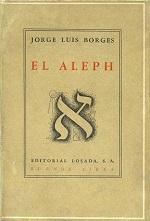La otra muerte
- by Jorge Luís Borges
- Short Story
- Fantasy
- Adults
- Definite Time Travel
- Spanish
- “La otra muerte” [The other death] by Jorge Luís Borges, in El Aleph (Editorial Losada, 1949).
I’ve read many translated stories of Jorge Luis Borges, and many of those have surreal time elements, but this is the only one that I’ll deem to have time travel with a sophisticated branching universe, no less!
In the story, Borges himself tells of a man, Dom Pedro Damián, who first has a history as a soldier who lost his nerve at the 1904 Battle of Masoller and then lived out a long, quiet life. But after Damián dies some decades later, a second history appears in which the soldier was actually a dead hero at that very same battle, and no one remembers anything of the earlier life.
Motivated by the final part of Dante’s Divine Comedy, Borges argues that the only complete explanation involves God granting a death-bed wish to the 1946 Damián, allowing him to return to the 1904 battle, causing time to branch into two universal histories, the first of which is largely—but not wholly—suppressed.
In the story, Borges himself tells of a man, Dom Pedro Damián, who first has a history as a soldier who lost his nerve at the 1904 Battle of Masoller and then lived out a long, quiet life. But after Damián dies some decades later, a second history appears in which the soldier was actually a dead hero at that very same battle, and no one remembers anything of the earlier life.
Motivated by the final part of Dante’s Divine Comedy, Borges argues that the only complete explanation involves God granting a death-bed wish to the 1946 Damián, allowing him to return to the 1904 battle, causing time to branch into two universal histories, the first of which is largely—but not wholly—suppressed.
In the fifth chapter of that treatise, Pier Damiani asserts—against Aristotle and against Fredegarius de Tours—that it is within God’s power to make what once was into something that has never been. Reading those old theological discussions, I began to understand Pedro Damiá’s tragic story.

Tags
(1)
- Groupings
Variants
(1)
- “La otra muerte” [The other death] by Jorge Luís Borges, in El Aleph (Editorial Losada, 1949).
